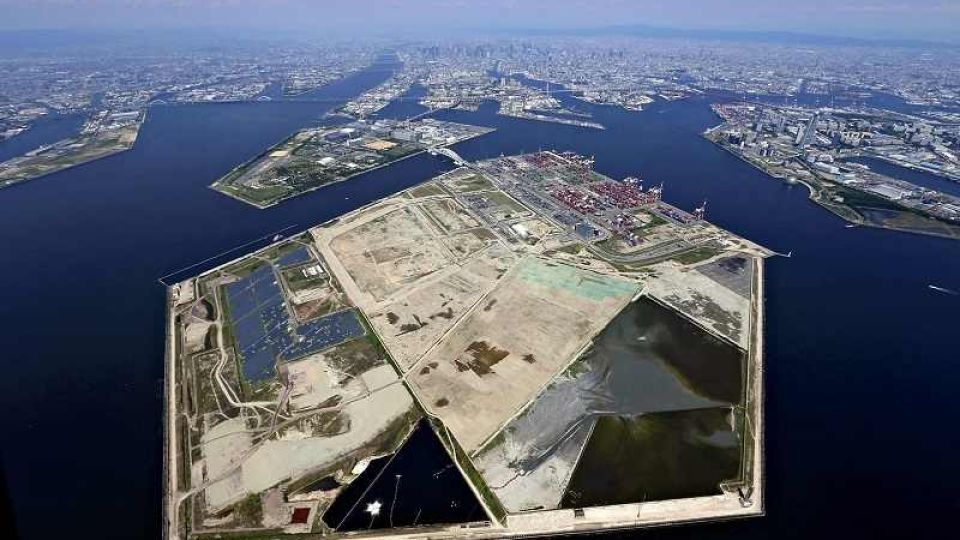July 19, 2022
OSAKA — The countdown to Expo 2025 Osaka, Kansai has started as Monday marked 1,000 days to go before the exposition opens. Preparations have gotten into full swing, with participating countries and territories exceeding 90% of the target of 150.
While plans to build pavilions have been progressing, the costs of construction might rise considerably amid the soaring prices of materials, with the impact of Russia’s invasion of Ukraine casting a large shadow.
The World Expo will run from April 13, 2025, through Oct. 13, 2025, on Yumeshima, an artificial island in Osaka Bay.
The central government has positioned Expo 2025 as a trigger for economic growth following the Tokyo 2020 Olympic and Paralympic Games held last summer, hoping that the event will draw foreign visitors. The projections are for 28.2 million visitors with an economic ripple effect of ¥2 trillion.
Under the theme “Designing Future Society for Our Lives,” the event looks to make use of the strengths of Osaka in particular and Kansai at large. There is an accumulation of leading pharmaceutical companies and research institutes in the area, and one intention is to disseminate solutions to the universal challenges for human beings: health and longevity.
Just like Expo 1970 Osaka, the basic idea of holding the event remains the same: to enable people to enjoy eye-opening exhibitions and programs.
“For people to come in contact with others and feel a lively atmosphere at a real site,” Osaka Gov. Hirofumi Yoshimura said, “is an intrinsic desire of human beings.”
Flying cars
Taking a pivotal role are eight pavilions for thematic projects to give concrete form to the theme of the Expo 2025.
Eight noted creative and academic figures, from filmmaker Naomi Kawase to media artist Yoichi Ochiai, serve as producers of the thematic pavilions under the basic plan unveiled in April.
Under consideration are exhibitions of reactive organisms that move in response to the body temperature and breathing of visitors, and a simulated near-death experience with the use of augmented reality (AR) technology.
Pavilions for private entities, with 12 business firms and organizations participating, are also likely to become popular. Bandai Namco Holdings Inc., which produces video games, toys and other entertainment content, plans to exhibit the world of Mobile Suit Gundam, a popular anime. Osaka’s own Yoshimoto Kogyo Holdings Co., an entertainment conglomerate known for producing comedy acts, will hold its events under the theme of “Warai (laughter) Mirai (future).”
As a means of transportation for visitors at the site, flying cars now being developed to be put into actual use jointly by the public and private sectors are also expected to make their appearance.
The number of participating countries and territories has been rising sharply, with as many as 140, including some that have yet to make an official announcement, expected to take part.
“This was faster than anticipated,” said Masakazu Tokura, chairman of the Japan Association for the 2025 World Exposition who is also the chairman of Keidanren (Japan Business Federation). “Countries have come to sense the significance of the World Expo.”
Soaring costs
As preparations for Expo 2025 progress, there are growing concerns among officials over a massive increase in the costs of building the site, which were set at ¥185 billion when its basic scheme was worked out in December 2020.
The rising costs have been due to the soaring prices for construction materials, which stems from the impact of Russia’s invasion of Ukraine in February this year, coupled with a sharp decline in the value of the yen on currency markets in recent months.
According to the Tokyo-based Construction Research Institute, the price of an H-beam, used for pillars and beams in a building, was ¥119,000 per ton in July 2022 in the Osaka area, up about 60% from December 2020. The prices of resources such as natural gas and petroleum have risen, raising the manufacturing cost of steel materials.
The expected construction costs stated in the basic scheme were up 50% from the ¥125 billion originally estimated when Osaka presented its bid to host the event.
The Japan Association for the 2025 World Exposition, which manages the event, explains that it will look to hold the costs within the current budget. The group added that at the present moment the time had not yet come to specifically consider raising the cost.
A high-ranking central government official said, however, “It is difficult to keep things as they are.”

